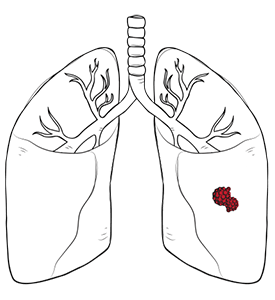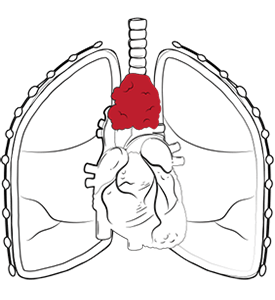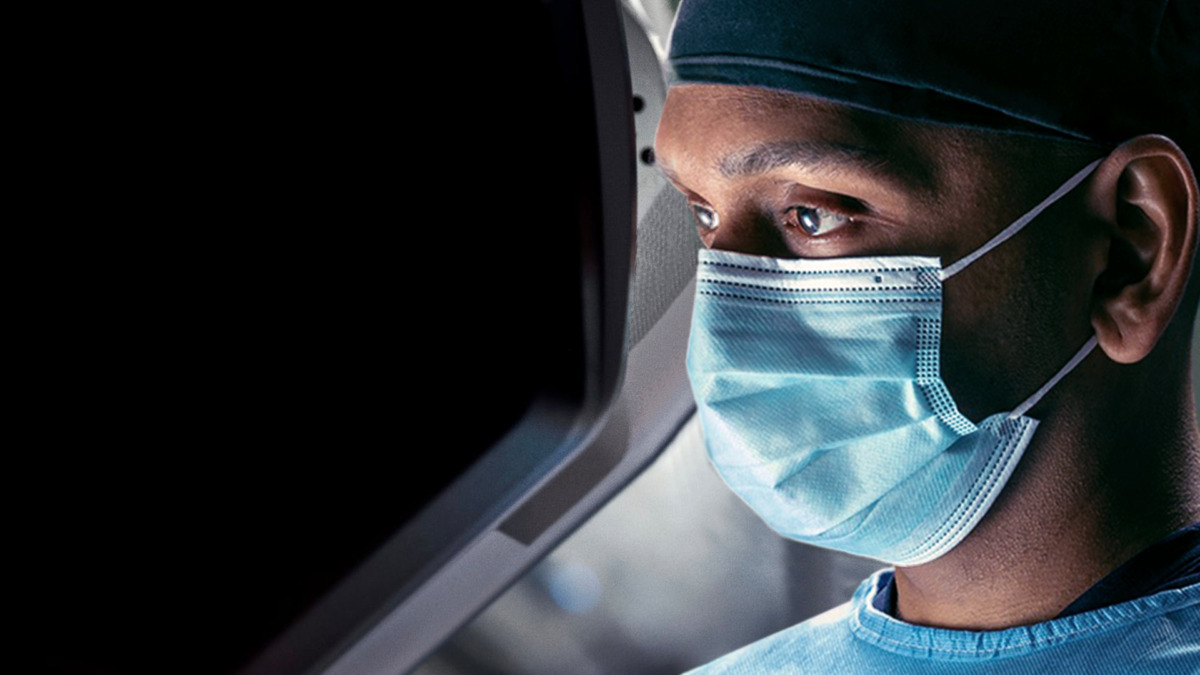

Mediastinal tumours are not a specific type of tumour; instead, it is a blanket term for masses in a region of the body. As such, though mediastinal tumours can affect people of any age and gender, certain types of mediastinal tumours are more common in certain populations.
The mediastinum is the area of your torso that forms the space between your lungs from both sides and extends from behind your chest to the spine. It is split into three regions: the anterior (front) behind the breastbone and in front of the heart; the middle which is in between your heart and directly between the lungs; and, the posterior (back) closest to the spine.
The incidence of neoplasms in this region of the chest present less often than elsewhere throughout the body. In Singapore, the incidence of mediastinal tumours is relatively low, with an estimated incidence rate of 2.4 cases per 100,000 people. However, due to the sensitive, vital organs in this region of the chest, these abnormal growths can pose major health concerns.

Different types of tumours are more common in the different areas of the mediastinum. The most common types of mediastinal tumours are thymomas and lymphomas. Surgical removal is required in cases involving:
Both men and women can develop mediastinal tumours, and the risk is not significantly higher for one gender compared with the other. However, thymomas are more common in men and patients with myasthenia gravis, while others, such as lymphomas, are more common in the young and women. It is important to speak with a healthcare professional if you have any concerns about mediastinal tumours or any other health issues.

The treatment for mediastinal tumours is often surgical resection of the abnormal growth. The type of mediastinal tumours surgery depends on both the type of tumour and its location on the mediastinum. Before our thoracic specialists at Neumark Surgery can determine which intervention can provide the best outcome for your clinical case, they will first use a computed tomography (CT) scan to locate the tumour.
Following analysis of the results, a biopsy can determine whether the growth is benign or malignant before a treatment plan is recommended. Certain tumours may require radiation therapy or chemotherapy after the surgery to ensure the tumour remains in remission.
A cyst can be addressed via either robotic-assisted or video-assisted thoracic surgery (VATS) — both are minimally invasive technologies used in the treatment of benign and malignant mediastinal tumours. Lymphomas, on the other hand, usually require chemotherapy for effective treatment. In some cases, a sternotomy procedure may be required when the mediastinal tumour growth rate is abnormally large or is afflicting vital structures such as blood vessels.
Our surgeons will walk you through the options available to you after determining the type, severity and location of the tumour.
Mediastinal cancer is treatable. Treatment varies depending on the type of tumour, and the risk factors differ. Most patients after undergoing treatment have favourable outcomes, though this depends on the stage of the tumour and the type of tumour. Inoperable mediastinal tumours rarely occur in patients.
The speed of growth for mediastinal tumours varies greatly depending on the type of tumour. A lymphoma often doubles in size every six to twelve months, whereas a thymoma grows at a much slower rate.
Mediastinal tumour symptoms vary depending on its location and severity. A mediastinal tumour in the posterior region can result in numbness or pain in the spine, if it’s in contact with the spinal cord. A tumour in the middle mediastinum can cause shortness of breath, as it affects the lungs. A tumour in the anterior region can create a sense of stuffiness or fullness in the chest, with a growth taking up what would usually be empty space.
As with most questions surrounding mediastinal tumour, this depends on the type of tumour, and the resulting type of surgery. In general, if the tumour is nearer to a vital organ, such as the lungs, this may require more hospitalisation and mediastinal surgery recovery time compared with those more distant from vital organs. Surgeries after cyst removal will necessitate less time to recover than surgery following a thymoma removal, which may need subsequent radiation therapy.
DISCLAIMER: The information provided on this website is for general informational purposes only and is not intended as a substitute for professional medical advice, diagnosis, or treatment. The use of this website does not create a doctor-patient relationship and no medical advice should be inferred or assumed. It is the user’s sole responsibility to seek the advice of their healthcare professionals for any medical concerns they may have and the user should not disregard, or delay, prompt medical advice for any such condition.
Neumark Lung and Chest Surgery Centre benefits from the expertise of a multidisciplinary team led by Dr Harish Mithiran, senior consulting thoracic surgeon at Gleneagles Hospital and Mt Alvernia Hospital.
Neumark is a lung and chest specialist centre with access to leading treatment modalities to achieve the best possible outcomes for lung disease and preventative patient screening.
Our foremost priority is to treat your condition as effectively as possible. Schedule a private consultation today; complete the form below, call, +65 6908 2145; WhatsApp, +65 9726 2485; or email, info@neumarksurgery.com.
Access the latest advice as well as full support throughout your treatment, and during after-care.
Learn how to refer a patient or to joining our physician network of leading providers in Singapore and abroad.
Main Surgery Centre
6 Napier Rd
#02-09 Gleneagles Medical Centre
Singapore 258499
820 Thomson Road
#06-07 Mount Alvernia Hospital Medical Centre A
Singapore 574623
Neumark Lung & Chest Surgery Centre benefits from the expertise of a multidisciplinary surgical team led by Dr Harish Mithiran, a senior consulting thoracic surgeon at Gleneagles Hospital.
With access to leading minimally-invasive treatment modalities for lung disease and chest conditions, our specialists in Singapore work to achieve the best possible outcomes for lung disease. Our foremost priority is to treat your condition as effectively as possible with world-class care.
6 Napier Road
#02-09 Gleneagles Medical Centre
Singapore 258499
820 Thomson Road
#06-07 Medical Centre A
Singapore 574623
© 2025 Neumark Lung & Chest Surgery Centre Pte. Ltd. | UEN 202136971R
Gleneagles Medical Centre
6 Napier Road
#02-09 Gleneagles Medical Centre
Singapore 258499
Mount Alvernia Hospital
820 Thomson Road
#06-07 Medical Centre A
Singapore 574623